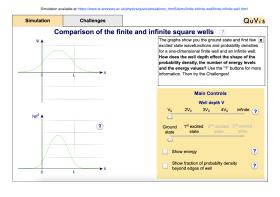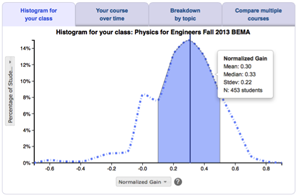
Developed by: Antje Kohnle and the PER team at the University of St. Andrews




middle schoolhigh schoolintro collegeinter-mediateupper levelgrad school other

calc based

alg based

conceptual







Overview
What? QuVis is a collection of research-based interactive simulations for learning quantum mechanics concepts ranging from the advanced high school to advanced undergraduate level. Simulations help students make connections between multiple representations and explore relationships between quantities.
Why? QuVis makes the invisible visible and enables students to collect data to see how quantities are determined experimentally; make connections between physical, mathematical, and graphical representations; and compare and contrast classical and quantum behavior under the same experimental conditions.
Why not? You might prefer to use different research-based materials designed for quantum mechanics courses, such as Paradigms in Physics or CU upper-division QM curriculum or QuILTs.
Student skills developed
- Conceptual understanding
- Making real-world connections
- Using multiple representations
Instructor effort required
- Low
Resources required
- Computers for students
Resources
Teaching Materials
You can view and download all the QuVis simulations and associated problem sets for free from the QuVis website.
Research
This is the third highest level of research validation, corresponding to:
- at least 1 of the "based on" categories
- at least 1 of the "demonstrated to improve" categories
- at least 1 of the "studied using" categories
Research Validation Summary
Based on Research Into:
- theories of how students learn
- student ideas about specific topics
Demonstrated to Improve:
- conceptual understanding
- problem-solving skills
- lab skills
- beliefs and attitudes
- attendance
- retention of students
- success of underrepresented groups
- performance in subsequent classes
Studied using:
- cycle of research and redevelopment
- student interviews
- classroom observations
- analysis of written work
- research at multiple institutions
- research by multiple groups
- peer-reviewed publication
References
- A. Kohnle, Using student-generated content to engage students in upper-division quantum mechanics, presented at the Physics Education Research Conference 2019, Provo, UT, 2019.
- A. Kohnle, C. Baily, A. Campbell, N. Korolkova, and M. Paetkau, Enhancing student learning of two-level quantum systems with interactive simulations, Am. J. Phys. 83 (6), 560 (2015).
- A. Kohnle, C. Baily, C. Hooley, and B. Torrance, Optimization of Simulations and Activities for a New Introductory Quantum Mechanics Curriculum, presented at the Physics Education Research Conference 2013, Portland, OR, 2013.
- A. Kohnle, C. Baily, and S. Ruby, Investigating the Influence of Visualization on Student Understanding of Quantum Superposition, presented at the Physics Education Research Conference 2014, Minneapolis, MN, 2014.
- A. Kohnle, I. Bozhinova, D. Browne, M. Everitt, A. Fomins, P. Kok, G. Kulaitis, M. Prokopas, D. Raine, and E. Swinbank, A new introductory quantum mechanics curriculum, Eur. J. Phys. 35 (1), 015001 (2013).
- A. Kohnle, D. Cassettari, T. Edwards, C. Ferguson, A. Gillies, C. Hooley, N. Korolkova, J. Llama, and B. Sinclair, A new multimedia resource for teaching quantum mechanics concepts, Am. J. Phys. 80 (2), 148 (2012).
- A. Kohnle and E. Deffebach, Investigating student understanding of quantum entanglement, presented at the Physics Education Research Conference 2015, College Park, MD, 2015.
- A. Kohnle, A. Jackson, and M. Paetkau, The Difference Between a Probability and a Probability Density, Phys. Teach. 57 (3), (2019).
- A. Kohnle and A. Rizzoli, Interactive simulations for quantum key distribution, Eur. J. Phys. 38 (3), 035403 (2017).
- G. Passante and A. Kohnle, Enhancing student visual understanding of the time evolution of quantum systems, Phys. Rev. Phys. Educ. Res. 15 (1), 010110 (2019).





